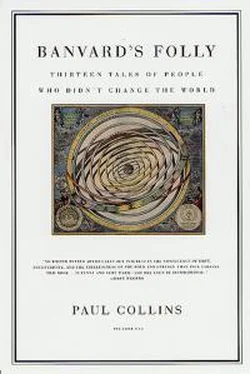"I take the liberty of introducing myself to you without introduction," the letter began, "because you are the only one I know of in this hemisphere able to appreciate the position in which I find myself at this moment ...."
As the American consul in Liverpool, Nathaniel Hawthorne was used to receiving all sorts of pleas and complaints from Americans who had managed to strand themselves, land in jail, lose their way, and otherwise fall upon hard times thousands of miles from home. And this letter was from London--not his branch consulate's territory, strictly speaking. But he did recognize the name at the bottom, and remembered the strange genius his sister-in-law Elizabeth had spoken so highly of.
She had poured out her theories, her travails, and her hopes for publication to him. Writing back, he marveled at her utter dedication: "Whether right or wrong ... you have acquired some of the privileges of an inspired person and a prophetess--and the world is bound to hear you, if for nothing else, yet because you are so sure of your mission."
They exchanged friendly letters back and forth, and he paid her debts and read her essays--but at first she would not see him. The world of people was no longer hers. The teeming streets of London, when she ventured into them at all, were filled with inhabitants of a former world. She was a mere vessel for the Theory that had grown within her, taking over her bones and muscle, pushing out the blood and marrow.
Finally, in June 1856, she relented in a note not unlike those penned by Emily Dickinson to the one writer she deigned to show her face to. It is haunted by the soul of a body that is not even dead yet:
I hope you will call upon me. The reason I shrink from seeing any one now is, that I used to be somebody, and whenever I meet a stranger I am troubled with a dim reminiscence of the fact, whereas now I am nothing but this work and dont wish to be. I have lived for three years as much alone with God and the dead as if I had been a departed spirit. And I dont wish to return to the world. I shrink with horror from the thought of it. This is an abnormal state you see, but I am perfectly harmless. But if you will let me know when you are coming I will put on one of the dresses I used to wear the last time I made my appearance in the world, and try to look as much like a survivor as the circumstances will permit.
When Hawthorne visited her, he was surprised. She was not the haunted being that he had expected at all--"She was rather uncommonly tall, and had a striking and expressive face, dark hair, dark eyes, which shone with an inward light as soon as she began to speak." The prospect of his visit reanimated her, and brought her enthusiasm alive again. When he praised the parts of the book that she had sent him and asked her when she would address finding historical documentation of the literary cabal, she confidently tapped a volume of Bacon's letters. She would not, she said, try breaking into Francis Bacon's tomb again.
"Bacon himself showed me my error," she confided to the writer "The evidence is in Shakespeare's grave."
She waited in the aisle as the sun set, and a gloom gathered in the Holy Trinity Church. She was alone. The pews were empty, and she quietly held a candle the clerk had given to her; its light cast a faint glow on the stones beneath her. Under one of these stones lay the mortal remains of William Shakespeare. Above her stood his bust, staring down at the woman who would dare disturb his bones.
As the church fell into total darkness, she lit her lantern and began sizing up her task. The stones were not so large, and they could be moved with effort. Perhaps there would be a sarcophagus lid to move as well. But not more than a few feet below her, in either case, lay the packet of papers that she believed were hinted at in the letters of Francis Bacon.
She heard a creak far back in the church--the clerk, perhaps fearful of her plans, had hidden himself to spy on his own church. Hours passed, and she could not be sure whether he had left. And so she just stared at the stones beneath her feet, the cool stone beneath her fingers, that somehow lay utterly out of reach. She had neither the strength nor the daring to tear them up from the floor.
At ten o'clock, per their agreement, the clerk returned and let Delia Bacon out of the church. She wandered off into the night.
She could have done it. But she chose not to, because in that moment of clarity on the floor of the church she knew what she would find--what she would not find-in Shakespeare's grave. And her older brother, always her toughest critic, knew it too when he wrote to her: Misguided by your imagination, you have yielded yourself to a delusion which, if you do not resist it and escape from it as for your life, will be fatal to you. How to say less than this, I know not. I am now to inform you that your theory about Shakespeare and Shakespeare's tomb and all that is a mere delusion--a trick of the imagination. For five years you have known that I think so. And--O my dear sister--can you not, in God's name, and in the strength which he will give you, break the spell, and escape from the delusion?
And yet she clung to hope. Her theory could be proved, if only the world could see her book. She continued anxious, frenzied letters to Hawthorne, her sole friend left in the entire country, and the only person left in the world, it seemed, who would still listen to her. When he landed her a publisher--as he finally did in October 1856, with Groombridge and Sons --Bacon and the publisher alike relied on him to provide a preface for the book. He was a famous man. His word could get her taken seriously.
But he could not do it.
Or rather, he could, but he would not agree with her. It was a brilliant book in places, yes, but it was turbulent and jumbled, and, well ... he just did not believe her theory. He finally ground out, with agonizing slowness, a preface that praised her as a dedicated and brilliant scholar. But he refused to affirm her theory.
When Bacon saw it, she was furious. She was the Theory now--any attack on the Theory was an attack on her. Her letters turned frenzied: I have renounced all that I was, every joy and solace in life, to make myself a medium for those spirits that have been waiting so long to give their message. You must not decry my inspiration. You will find the title-page a more perilous place than you thought, if you do, for I shall throw you off entirely. You can not come inside of this book, if you are going to throw doubt on the Oracle. I consider myself a priestess ... and I dont allow of any scepticism or profane speeches within the lids of this book.
But Hawthorne would not balk. Enraged, Bacon cut Hawthorne off without a word, and never spoke to him again.
The Philosophy of Shakespere's Plays Unfolded arrived at bookstands that April. It was a dense, heavy tome of more than six hundred pages. Copies went to reviewers around the country, and Bacon waited for days and weeks as they read through it. Her vindication was about to begin.
Biographical accounts of Delia Bacon --Hawthorne's 1863 article in The Atlantic Monthly, Theodore Bacon's 1888 account, and the 1959 biography by Vivian Hopkins--all share one striking characteristic. They do not quote from her book. Almost without exception, they talk around her book-describing it in broad terms, quoting from her letters about it, quoting the comments of contemporaries, even venturing a little into her Putnam's article or the preface of Philosophy, but ... never into the book itself.
Inevitably, impious thoughts form in the mind of any reader. Did these writers not read Delia Bacon's most famous work? And as it turns out, the answer generally is no, they did not. Theodore admitted to his friends that he had never read her book, and Nathaniel Hawthorne has this to say in his own account: "I believe that it has been the fate of this remarkable book never to have more than a single reader. I myself am acquainted with it only in insulated chapters and scattered pages and paragraphs."
Читать дальше











